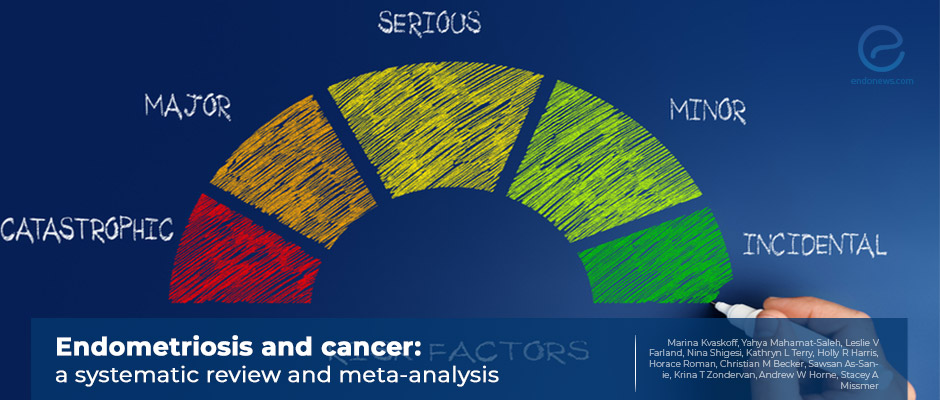Cancer, is that a real risk?
Apr 13, 2021
Prevention through healthy lifestyles is still the key
Key Points
Highlight:
- This scientific review of the literature and meta-analysis investigated the association between endometriosis and the risk of cancer.
Importance:
- Endometriosis was found to be associated with a higher risk of ovarian and thyroid cancer, but a reduced risk of cervical cancer.
- However, the authors caution that the majority of existing studies had a risk of bias and heterogeneity, therefore the findings should be treated with care.
What has been done:
- Identification of cohort and case-control studies that had examined the association between endometriosis and cancer risk in PubMed and Embase databases, which present the risk with 95% confidence interval.
- Cross-sectional studies and case reports were excluded.
- The authors used several statistical methods to estimate summary relative risks, assess heterogeneity across studies, risk of bias, and publication bias.
Results:
- Forty-nine studies were included in the meta-analysis.
- Endometriosis was positively associated with and ovarian cancer.
- The strongest associations were between endometriosis and ovarian clear cell and endometrioid histology subtypes. However, there was evidence of heterogeneity across studies and publication bias.
- There was a very small positive association with breast cancer.
- No significant association with colorectal cancer, endometrial cancer, cutaneous melanoma.
- Endometriosis was inversely associated with cervical cancer, but this result may be because women with endometriosis have existing access to detection of dysplasia, therefore the association is probably not causal.
Limitation:
- Many of the studies included in the meta-analysis were insufficiently powered to evaluate risk heterogeneity related to endometriosis phenotypes and cancer subtypes.
Lay Summary
Endometriosis is non-malignant but shares some similar features with cancer, such as the occurrence of local and distant foci, the ability to resist cell death, and the ability to invade other tissues, causing damage to the organs. Endometriosis also generates chronic local and systemic inflammation. Several studies have found that endometriosis is associated with a higher risk factor of certain cancers, especially ovarian cancer. Recent gene sequencing studies suggested that around 20% of ovarian endometriosis and deep endometriosis lesions have somatic cancer driver mutations, even though these mutations are also seen in eutopic endometrium from healthy women. Therefore, accurate assessment of cancer risk in women with endometriosis is important because it influences women's cancer screening, prevention, and clinicians’ decisions in the long-term management of women with endometriosis.
This study by Kvaskoff and Missmer, with their colleagues from multiple research centers across the globe, is a systematic review and meta-analysis of published studies that examined the associations between endometriosis and cancer risk; recently published in "Human Reproduction Update". The authors evaluated the reliability of these studies and offer recommendations for long-term management of women with endometriosis in relation to the cancer risk. This meta-analysis included cohort and case-control studies that had examined the associations between endometriosis and cancer risk either as an overall or according to cancer and endometriosis subtype. These previous publications included only when they reported the risk estimates (RR, hazard ratio (HR), standardized incidence ratio (SIR) or OR) with a 95% confidence interval.
Overall, the analyses identified in total 49 publications, with 38 studies including 19 cohorts and 19 case-control that satisfied all the inclusion criteria for further analyses. It must be noted that the sample sizes among these studies varied widely.
The results confirmed that endometriosis was associated with a 1.9-fold greater risk of ovarian cancer compared with women without endometriosis. This association was higher for clear cell (3.4-fold) and endometrioid (2.3-fold) histological subtypes of ovarian cancer. However, study heterogeneity and publication bias related to these studies were noted. Particularly, the risk was likely driven by those with an endometrioma.
Endometriosis was also very slightly (4%) associated with a higher risk of breast cancer and in a small number of studies a greater risk of thyroid cancer. Interestingly, the relationship with endometrial cancer was not statistically significant, despite the previous meta-analyses which found a positive correlation. The most robust observation was the association between endometriosis and a 32% lower risk of cervical cancer.
In an attempt to communicate more accurately about the risk of ovarian cancer in women with endometriosis, the authors suggested that ovarian cancer is rare regardless of women’s endometriosis status. The absolute risk to develop ovarian cancer in the general population is 1.3% according to the National Cancer Institute Surveillance, Epidemiology, and End Results Program (National Cancer Institute, 2017). Translating this in the absolute risk for women with endometriosis was 1.8%, which is just a 0.5% difference from women without endometriosis. Therefore, the authors conclude that the risk is still very low.
Given these low absolute risk of ovarian, breast, and thyroid cancers, the authors suggested general prevention messages, i.e., that women with endometriosis should be aware of well-demonstrated cancer risk factors and the need to focus on aspects of wellness that have been demonstrated to reduce cancer risk in general (https://siteman.wustl.edu/prevention/ydr/). These include avoiding smoking, maintain a healthy weight, exercise regularly, have a balanced diet with high intakes of fruits and vegetables, low intake of alcohol, and use sun protection.
Research Source: https://pubmed.ncbi.nlm.nih.gov/33202017/
epidemiology methodology cohort-studies case-control studies bias heterogenty ovarian cancer endometriosis.

